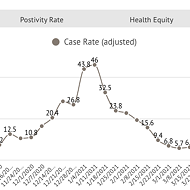Monday, September 28, 2020
Family Service Agency to provide health support for Santa Barbara County farmworkers
Posted By Malea Martin on Mon, Sep 28, 2020 at 4:22 PM
As the name suggests, the state’s Housing for the Harvest program funds temporary housing for farmworkers who have been exposed to or tested positive with COVID-19. But the program also gives counties the opportunity to partner with local administrators to provide support such as wellness checks for vulnerable farmworkers.
On Sept. 22, the Santa Barbara County Board of Supervisors voted to make Family Service Agency that local touch point. The nonprofit works to ensure access to food, shelter, and other basic needs for seniors, families, and children as well as provides case management, advocacy, and mental health programs.
The agreement, which was voted in as part of the board’s administrative agenda, will appropriate $906,100 to Family Service Agency “to provide support services for the Housing for the Harvest program,” the board agenda stated. It also allocates $100,400 for the Latinx and Migrant COVID-19 Task Force and Language Justice Project to provide “operational support, engagement, and outreach services related to the prevention of the spread of COVID-19” in the county’s farmworker community.
Andy Caldwell, founder of the Coalition of Labor Agriculture & Business (COLAB) and Republican candidate for California’s 24th Congressional District seat, expressed some reservations about the funding allocations and the task force during public comment.
“We don’t have a problem with reaching out to workers,” he said on behalf of COLAB. “However, of the farmers I’ve talked to, nobody knows who is on the [Housing for the] Harvest and Latinx and Migrant COVID-19 Task Force.”
Caldwell said he wanted to know who was on the task force, specifically “whether there’s any growers on that.” He also asked what the task force’s Language Justice Project “has to do with COVID.”
Melissa Smith, a doctor and interim director of the task force, gave her answers to these questions during her public comment that followed Caldwell’s.
Smith said the task force includes “96 participating organizational, cross sectoral partners, including community based organizations, health service providers, elected officials, and the county Departments of Health and Behavioral Wellness, among others.”
She added that many farmworkers face language barriers when it comes to accessing health care services, which is why it’s “critically important that these resources be allocated to support the work of the task force and its related language justice services.”
Community member Lee Heller also spoke in support of the agreement, arguing that everyone would benefit from fewer cases of COVID-19 in the farmworker community, and that a partnership with Family Service Agency would help the county get there.
“When their numbers go down, the county’s numbers go down, and when the county numbers go down, we can shift to a lower tier and reopen businesses that currently remain shuttered,” Heller said.
Hazel Davalos, Community Organizing Director with Central Coast Alliance United for a Sustainable Economy, also spoke during the meeting about the importance of the Housing for the Harvest program, given “the fact that it allows the county to contract with Family Service Agency to conduct wellness visits.”
“This means you have a culturally competent staff of volunteers visiting farmworkers in the hotel rooms, building trust, so that these folks feel forthcoming about sharing their symptoms and are able to ask questions about how to navigate the medical system,” she said.
Second District Supervisor Gregg Hart and 3rd District Supervisor Joan Hartmann both expressed support for the program, but 4th District Supervisor Peter Adam wanted more information.
“I would like to have a report from public health on exactly what they know about Housing for the Harvest and the Language Justice Project,” Adam said. “Who [are] these two organizations composed of? Who’s on the board? Who are the executive directors? What is their mission? What outreach to growers has been engaged of that public health is aware of?”
Board Chair Hart said that information would be gathered. The board ultimately voted 5-0 in favor of the administrative agenda, so the item passed. ∆
On Sept. 22, the Santa Barbara County Board of Supervisors voted to make Family Service Agency that local touch point. The nonprofit works to ensure access to food, shelter, and other basic needs for seniors, families, and children as well as provides case management, advocacy, and mental health programs.
The agreement, which was voted in as part of the board’s administrative agenda, will appropriate $906,100 to Family Service Agency “to provide support services for the Housing for the Harvest program,” the board agenda stated. It also allocates $100,400 for the Latinx and Migrant COVID-19 Task Force and Language Justice Project to provide “operational support, engagement, and outreach services related to the prevention of the spread of COVID-19” in the county’s farmworker community.
Andy Caldwell, founder of the Coalition of Labor Agriculture & Business (COLAB) and Republican candidate for California’s 24th Congressional District seat, expressed some reservations about the funding allocations and the task force during public comment.
“We don’t have a problem with reaching out to workers,” he said on behalf of COLAB. “However, of the farmers I’ve talked to, nobody knows who is on the [Housing for the] Harvest and Latinx and Migrant COVID-19 Task Force.”
Caldwell said he wanted to know who was on the task force, specifically “whether there’s any growers on that.” He also asked what the task force’s Language Justice Project “has to do with COVID.”
Melissa Smith, a doctor and interim director of the task force, gave her answers to these questions during her public comment that followed Caldwell’s.
Smith said the task force includes “96 participating organizational, cross sectoral partners, including community based organizations, health service providers, elected officials, and the county Departments of Health and Behavioral Wellness, among others.”
She added that many farmworkers face language barriers when it comes to accessing health care services, which is why it’s “critically important that these resources be allocated to support the work of the task force and its related language justice services.”
Community member Lee Heller also spoke in support of the agreement, arguing that everyone would benefit from fewer cases of COVID-19 in the farmworker community, and that a partnership with Family Service Agency would help the county get there.
“When their numbers go down, the county’s numbers go down, and when the county numbers go down, we can shift to a lower tier and reopen businesses that currently remain shuttered,” Heller said.
Hazel Davalos, Community Organizing Director with Central Coast Alliance United for a Sustainable Economy, also spoke during the meeting about the importance of the Housing for the Harvest program, given “the fact that it allows the county to contract with Family Service Agency to conduct wellness visits.”
“This means you have a culturally competent staff of volunteers visiting farmworkers in the hotel rooms, building trust, so that these folks feel forthcoming about sharing their symptoms and are able to ask questions about how to navigate the medical system,” she said.
Second District Supervisor Gregg Hart and 3rd District Supervisor Joan Hartmann both expressed support for the program, but 4th District Supervisor Peter Adam wanted more information.
“I would like to have a report from public health on exactly what they know about Housing for the Harvest and the Language Justice Project,” Adam said. “Who [are] these two organizations composed of? Who’s on the board? Who are the executive directors? What is their mission? What outreach to growers has been engaged of that public health is aware of?”
Board Chair Hart said that information would be gathered. The board ultimately voted 5-0 in favor of the administrative agenda, so the item passed. ∆
—Malea Martin







 2023 Pet Photo Contest Winners
2023 Pet Photo Contest Winners
 Winning Images 2023
Winning Images 2023
